Homies Sit in Front: Homeboy Industries Assumes its Voice in the Classroom
BY DANIEL SIMONDS | June 11, 2019
[Editor’s Note: This is the first in a three-part series highlighting the pursuit of higher education by members of the Homeboy Industries community, and their unique experiences and contributions in the classroom.]
“If I could apply myself to where I know the book part, because I have the lived experience…Damn, there ain’t no telling what I can do,” declared Pasadena City College sociology major and student commencement speaker for the class of 2019, Jessi Fernandez, as we discussed his journey to and through higher education.
Fernandez serves as trainee-intern in the educational services department at Homeboy Industries, a nonprofit committed to providing hope, training, and support to formerly gang-involved and previously incarcerated men and women. These trainees gain work experience, attend life skills classes for healing and personal development, and are enabled to get back on their feet via reentry services.
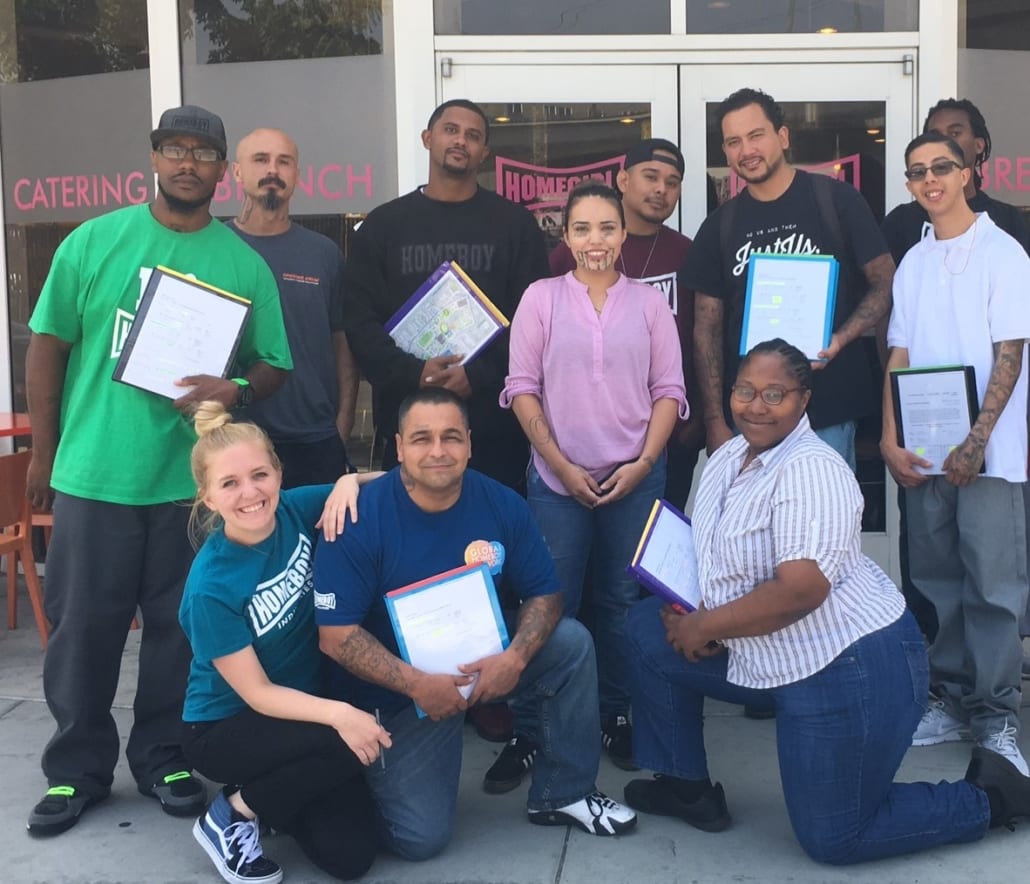
Academic programs coordinator Brittany Morton (bottom left) equips her scholars each semester with binders that contain class locations and information, as well as school supplies. Lami Glenn, Gabriel Lopez, and Jessi Fernandez are pictured with other scholars.
For some trainees, going to college is one component of their reentry process into society, as it is for many who are in pursuit of their high school diploma or GED.
As individuals who oftentimes carry profound backgrounds of trauma, embodying the “book part” has become the ethos of academic programs coordinator Brittany Morton’s sociological army. Yet, in order to begin transforming their classroom, the “homie”—a familial term utilized to describe those in the Homeboy community—must first walk through the door.
Inez Salcido, a GED cohort graduate-turned-substance abuse counselor/case manager and East Los Angeles College psychology major, reflected on the anxiety she felt “tattooed up” amongst “all of these young kids,” thinking, “how can I do this?” Then, a light bulb went off, and she realized the wealth of life experience she offers as a system-impacted student.
Feeling empowered to add to the proverbial table was “kind of amazing to see,” Salcido said, “because these kids don’t know.”
Nor do most professors. In fact, homies sang in a chorus of emboldened cacophony that the sociological theories students learn, and phenomena professors have studied, are the wallpaper to their lives. Salcido recalled a Morton-curated cohort of homies in an administrative justice class.
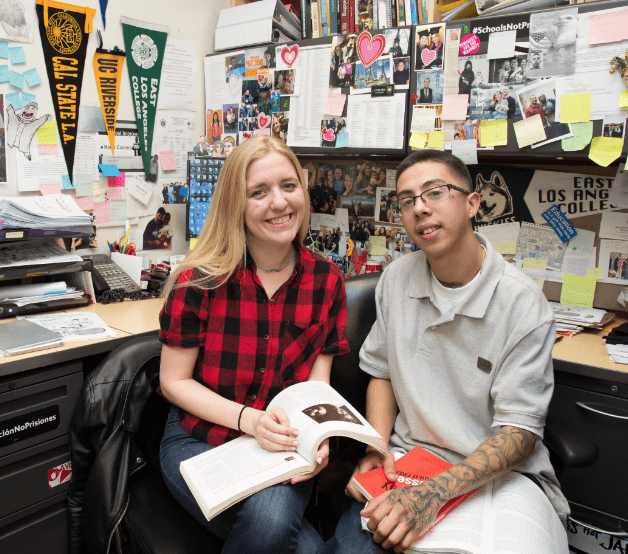
Academic programs coordinator Brittany Morton with educational services trainee-intern Jessi Fernandez.
“We’d come in, and we’d be like, ‘We know this shit,’” Salcido said.
The ivory tower of higher education reveals itself, instead, to be a gateway for homies to shed the “troublemaker” label they may have assumed in the K-12
system, only to don the graduation cap as educational ambassadors. These same students who were diagnosed for their expression of trauma and not the hardships that inflicted such pain gleefully embrace a venue to exercise their academic talents that have been left latent as a result of lack of opportunity.
Serving as the opportunity that was so elusive for many homies in the K-12 system are Homeboy’s GED and Twilight Adult High School programs, as well as Pathways to College. The latterprogram is at the heart of Morton’s college-advising. It is a community of connection and collaboration among Homeboy’s current and alumni students, aiding the Homeboy community in college enrollment, financing, academic support, and navigation through university bureaucracy as a first-generation student, and gaining resources as someone formerly incarcerated.
“The guidance and support we offer are what one would get from a parent or guidance counselor, but our community often doesn’t have that available to them, for a variety of reasons,” said Marissa Gillette, director of educational services.
Morton has spawned a small army of sociological change agents against the perpetual violence to communities of color that has created economic iniquity, as well as educational and opportunity gaps that inspire gang culture as the poor and criminalized are marginalized from mainstream society and all of its resources. Morton explains, in reference to systemic inequities and the utilization of both academic and lived knowledge, that to create change, “you can’t combat a problem unless you are able to pull the roots out.”
Gabriel Lopez, a Homeboy navigator, said that the operation begins the minute a homie steps into a college classroom, even if their classmates are initially scared. Lopez is a member of East Los Angeles College’s class of 2019, and earned associates degrees in social and behavioral sciences & sociology with honors, and will attend Cal State-L.A. this fall.
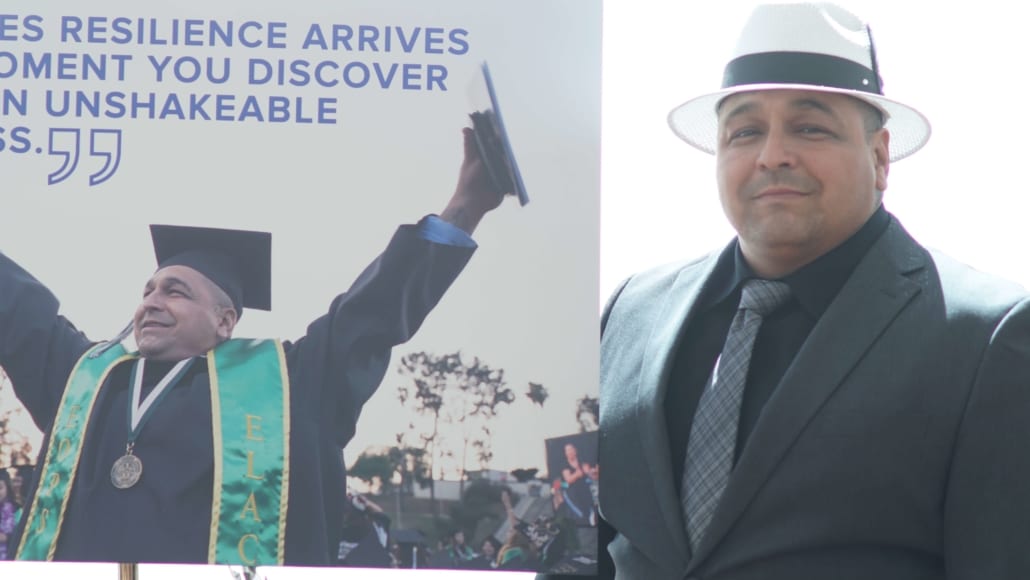
Gabriel Lopez, a Homeboy navigator and member of East Los Angeles College’s Class of 2019 poses with a poster celebrating his academic accomplishment at Lo Maximo, Homeboy Industries’ annual awards dinner.
“We’re all broken and want to be loved so bad—we’re not getting it at home—so, we’re willing to die for it,” explained Lopez, clarifying that gang members are not as hard as they may appear, but are innocent children who have survived serious trauma.
Lami Glenn, case manager, for example, won perfect attendance awards, earned a trip to Europe as a South L.A. junior high-schooler through his essay-writing, and read U.S. history while serving as a student clerk and teacher’s assistant in prison. The lure of the drug trade and limited job opportunities found Glenn leading a gang lifestyle. Glenn graduated from Los Angeles City College in 2019 and will attend Cal State-L.A. this fall.
Accepted by Cal State-L.A., despite losing his mother and swirling through the distractions of a gang background, Jessi Fernandez evaded disciplinary action in high school, as a result of his academic talent. Sitting in the dean’s office, school officials would search their database, only to find top marks next to his name.
“Why are you always getting in so much trouble? You got good grades,” Fernandez recollected.
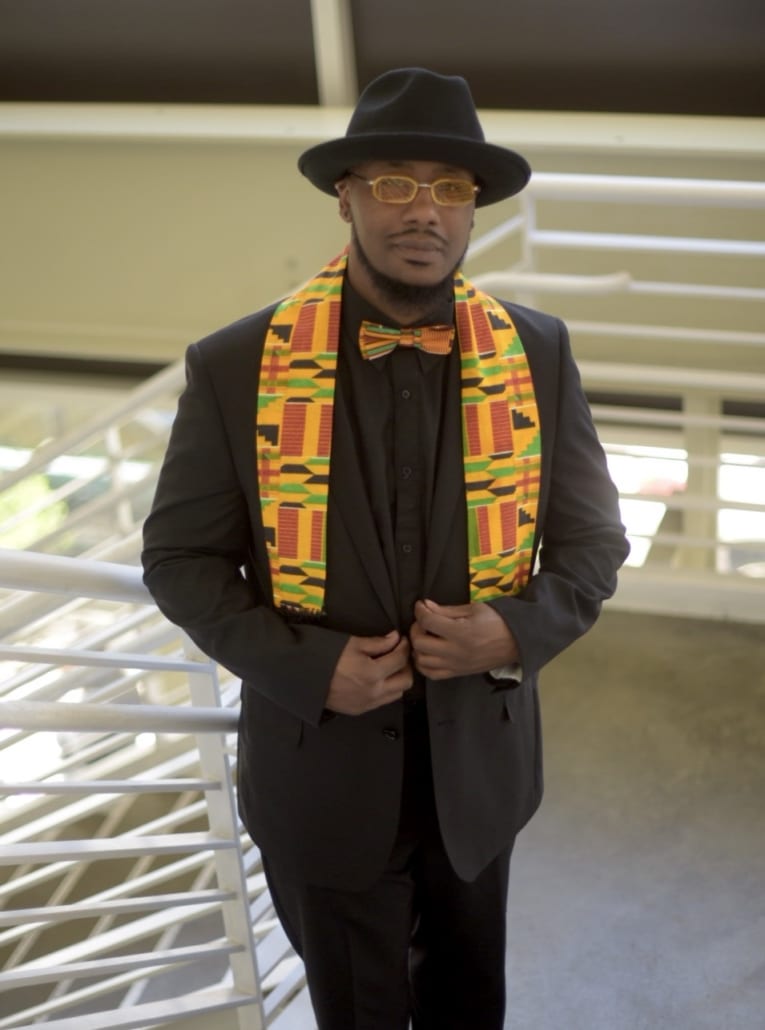
Lami Glenn poses for a photo prior to introducing the Homeboy Industries founder, Fr. Greg Boyle, at the organization’s landmark nonprofit showcase at L.A. Live—Lo Maximo.
After making a courageous first step into a highly codified world of academia, homies make that next step toward recognizing themselves in their studies, Morton said. This is part of the larger process of homies returning to themselves, as Father Greg Boyle, founder of Homeboy Industries, has termed the condition of rediscovering who we are upon healing.
Returned to themselves, homies speak the erudite sociological vernacular with crystalline articulation. Fernandez, for example, became engaged in class discussion in a contemporary social problems course because he related to the subject matter. It felt as though the class was modeled after his life.
“It’s not something I’ve really gotta think about. It’s just something I’m saying because it’s real and it’s natural. I’m not really studying these things because they’re lived experiences,” Fernandez said.
Homies, evidently, find that they speak the language in an academic field that is a reflection of their reality. Handed the scholastic toolbox, the formerly incarcerated and gang-involved author society’s definition of formerly incarcerated and gang-involved, rather than Hollywood.
Homies in higher education harness their resilience accumulated through years of profound life experience. Building one another up along the way, homies lift themselves and their communities out of unjust cycles of academic latency and into the most purposeful educational journeys one could discover. As I, too, will pursue higher education after my Jesuit Volunteer year at Homeboy, I intend to take a page out of my colleagues’ book as I, again, step into a lecture hall.
“Homies sit in front,” Salcido said.
Dan Simonds is a second year Jesuit Volunteer who, after a year teaching at Detroit Cristo Rey High School, is continuing his westward trek from the smallest town, Warren, in the smallest state, Rhode Island. He is serving in 2018-2019 as a Student Services Coordinator at Homeboy Industries in Los Angeles, California. Dan calls Gordon College—a small Christian liberal arts college near Boston—his alma mater.

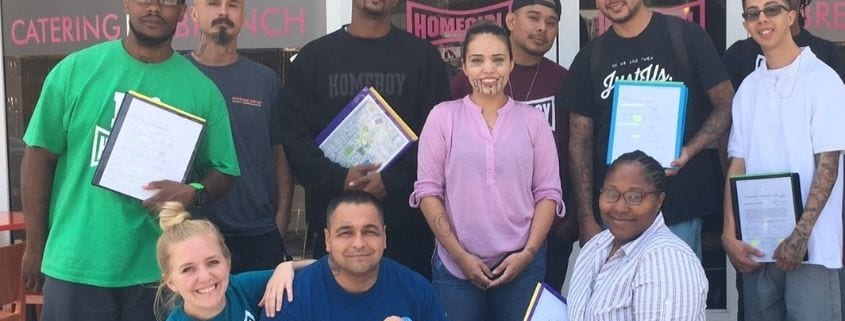

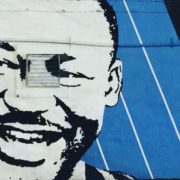



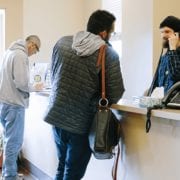

Homeboy Industries community is doing fine.
Great for them! I hope that as they move forward in their studies (in the classroom and out), the homies step outside of their foundation of experiences and actively seek learning about others and the world… When we move beyond our point (s) of reference, we are able to move beyond the “I” and develop true empathy. This is something we all could strive to do…